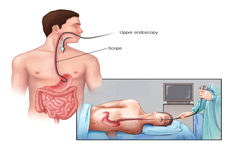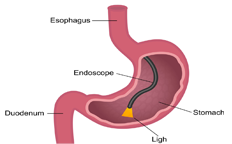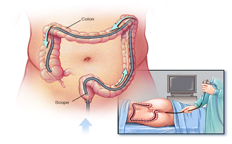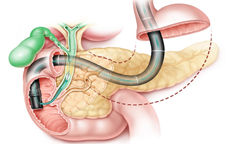Gastrointestinal bleeding
Your doctor will take a medical history, including a history of previous bleeding, conduct a physical exam and possibly order tests.
Ascitic Fluid Tapping
An ascitic tap is a medical procedure where a needle is used to drain fluid that is trapped in an internal body cavity, most commonly the abdomen (belly).
Esophageal Manometry
Esophageal manometry is a test that shows whether your esophagus is working properly. The esophagus is a long, muscular tube that connects your throat to your stomach.
Our Services

Endoscopy
Endoscopy is a nonsurgical procedure used to examine a person’s digestive tract. In addition, your doctor may use an endoscope to take a biopsy (removal of tissue).

Gastroscopy
Gastroscopy (or endoscopy) is an examination of the oesophagus (gullet or food pipe), stomach and duodenum (upper part of the small bowel) using a flexible telescope called a gastroscope.

Colonoscopy
A colonoscopy is an exam used to detect changes or abnormalities in the large intestine (colon) and rectum. Polyps or other types of abnormal tissue can be removed.

ERCP
Endoscopic retrograde cholangio-pancreatography (ERCP) is a diagnostic test to examine diseases of the liver, bile ducts and pancreas.There is a low incidence of complications.
FAQs
What is a gastroenterologist?
A gastroenterologist is a physician who specializes in the gastrointestinal tract (including the esophagus, stomach, small intestine, and large intestine) and other digestive organs (liver, pancreas, bile ducts, and gall bladder). Gastroenterologists see patients in the hospital and clinic, and also perform endoscopic procedures (e.g., upper endoscopy and colonoscopy).
Why Do I Need To See A Gastroenterologist?
Many conditions can cause problems during digestion. Chronic pain in the belly is one warning sign that something is wrong. experiencing symptoms, such as bloating, gas and diarrhea Abdominal pain and discomfort, Bleeding in the digestive tract are others. They’re all reasons to see a gastroenterologist. These doctors are trained to treat conditions that affect the organs of the digestive related tract, including the throat, stomach, colon, pancreas, and liver. If you notice any of the telltale symptoms, it may be time to check in with a gastroenterologist.
How Will My Primary Care Physician Work With My Gastroenterologist?
May I Take My Current Medications Before The Colonoscopy Or Any Other Procedure?
Some medications can be taken as usual, like blood pressure medication. Some medications can interfere with the exam. Inform your doctor about your medications and any allergies you may have to medications. The prep will also vary on the type of procedure scheduled.



